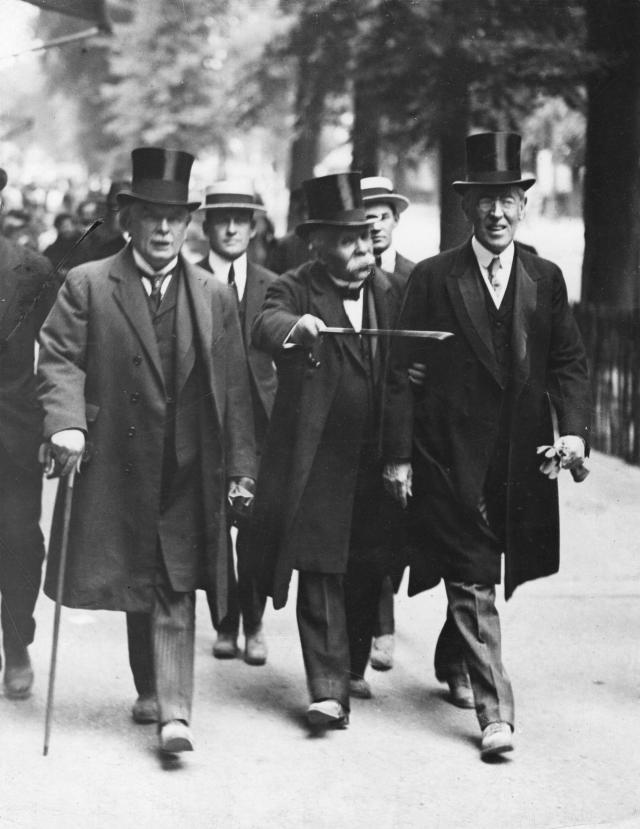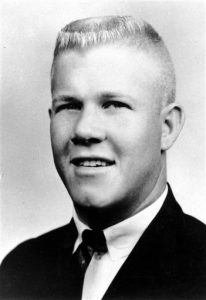Catastrophic war is something most people loathe and fear, and World War I brought exactly that, with over 38 million causalities, including approximately 17-20 million dead. There were many efforts to end the war, and various strategies to crush each side’s enemies. However, few at the time looked past just ending the war, let alone actually creating stable, sustainable peace. Woodrow Wilson was not one of those people. Wilson enumerated a plan for peace after the war in something titled Fourteen Points, which he gave as an address to the US Congress on January 8, 1918.1
To talk about the Fourteen Points, we must first discuss Wilson himself. Ranked among scholars as one of the nation’s best Presidents, Wilson was a Democrat and served as President through all of World War I and then some. He won the first term of his Presidency to some extent with a progressive plan called the New Freedom, in which he planned to eliminate industrial and financial monopolies, and he promised to reduce taxes on foreign imports. As the war began in Europe in 1914, Wilson was originally against U.S. involvement, but eventually he came to support the Allied Powers of Great Britain, France, and Russia because of German resumption of unrestricted submarine warfare.2 All of this suggests that Wilson understood the importance of being behind what the American people believed, but also strong enough to lead the nation using his own judgment, and not be a push-over. This is exactly what he did with his Fourteen Points, and the effects of it were astounding, and is a prominent reason for why he is regarded as one of the nation’s best Presidents.

The Fourteen Points served as a plan to create world-wide peace following the end of the Great War. Wilson argued for the world to be “made fit and safe to live in.” It would be “the programme of the world’s peace” as outlined in his Fourteen Points. Points 1-5 depicted Wilson’s vision of a world in which each country was independent and allowed to pursue its own goals safe from the aggression of others. The reason Wilson wanted this to happen was because, according to him, the European nations had caused this conflict because of their imperialist designs that had caused them to take their competition into their colonies and onto the high seas. Clashes in the colonies had caused them to engage in an arms race and to enter into secret alliances that committed each nation to wage war even when it was not in their national interests to do so.3 Wilson hoped to stop the chain reaction of events, like those from the summer of 1914, from occurring again by stating that countries should tend to their own matters, and that there should be no limitations on any country’s navigation of the seas or their pursuit of commerce, which was the upshot of “open covenants of peace, openly arrived at” and “absolute freedom of navigation upon the seas.” Point 4, the reduction of armaments, was especially significant for Wilson because of the link between massive build up for war and the compelling sense to use those armaments, even for minor conflicts. Wilson believed that all nations’ armaments should be reduced “to the lowest point consistent with domestic safety.”3
Points 6-13 focused on individual nations and what would happen to them, with the startling claim that their true success would be measured by “the acid test of their good will” on how Russia would be treated. Wilson felt that each nation should move its troops back to its original borders, and that the collapsing nations should be helped.3 This idea was in contrast to what the European allies wanted after the war. They felt the need to continue their military occupation of German territory, partly out of fear that the German’s would resume the war, and partly because they too were so broken by the war that they needed to claim German reparations by force if necessary. This caused significant problems in creating the ensuing peace treaties, particularly the Treaty of Versailles.6
The last of the Fourteen Points was the most important to Wilson, and had the greatest promise for him. In his fourteenth point, Wilson called for the creation of “a general association of nations” or a League of Nations, which would be an alliance of all the world powers, created with the intent of stopping future global wars and regional conflicts, and instead would create the conditions for sustained peace. Although the idea of such a League predated Wilson, Wilson was the strongest advocate for it in 1918. It is possible that without him, or without his Fourteen Points, the League of Nations might have never have formed.7
The legacy of Wilson’s Fourteen Points are the League of Nations’ creation, the facilitating of various treaties that brought World War I to an end, and a basis for how world-wide peace should be handled by attempting to reduce weapons and limit imperialism. However, the League of Nations ultimately broke down with Japan and Germany leaving the League in the 1930s, and collapsing completely with the onset of World War II. Wilson’s main goal of his Fourteen Points was to create this League of Nations that would usher in worldwide peace. Wilson received a stroke in 1919, due partly because of his heartbreak that his own Congress refused to ratify and join his League of Nations. Other elements of his Fourteen Points were also abandoned or ignored by Great Britain and France, particularly his desire to see the world decolonized. In other words, his ideas about world peace were at best too early for a world not ready for the kind of peace and cooperation that he envisioned. Also, when we analyze the speech that Wilson gave to Congress, we see that Wilson believed in the idea that peoples of the world should be allowed to determine their own destinies, something that later became known as the self-determination of peoples. Because this principle was inconsistently followed by the Allies, enabling the Czechs and the Poles to form their own nations but not the Germans with the Austrians to form their own nation, this inconsistency contributed in a large part to the chain-reaction that led to the National-Socialist party forming and coming to power in Germany and its subsequent ambitions to right the wrongs of the Treaty of Versailles. It also created a tension between the idealism of Wilson and the real-world aspirations of the British and French allies to maintain their empires.1
- Gale Encyclopedia of U.S. History: Government and Politics. Vol 2, 2008, s.v. “The Progressive Era (1890-1930).” ↵
- Gale Encyclopedia of U.S. History: Government and Politics. Vol 2, 2008, s.v. “The Progressive Era (1890-1930).” ↵
- Encyclopedia of Western Colonialism since 1450. Vol 3, 2007, s.v. “Fourteen Points.” ↵
- Encyclopedia of Western Colonialism since 1450. Vol 3, 2007, s.v. “Fourteen Points.” ↵
- Encyclopedia of Western Colonialism since 1450. Vol 3, 2007, s.v. “Fourteen Points.” ↵
- Gale Encyclopedia of U.S. History: War. Vol 1, 2008, s.v. “World War I (1914-1919).” ↵
- Encyclopedia of Western Colonialism since 1450. Vol 3, 2007, s.v. “Fourteen Points;” Gale Encyclopedia of U.S. History: War. Vol 1, 2008, s.v. “World War I (1914-1919).” ↵
- Gale Encyclopedia of U.S. History: Government and Politics. Vol 2, 2008, s.v. “The Progressive Era (1890-1930).” ↵



58 comments
Gabriella Galdeano
I liked the writing in this article, and the explanations of the points were easy to understand. The fourth point was surprising because our military is very big now. I did not know that the fourteenth point led to the League of Nations. Wilson did a great job of working toward achieving world peace. Although the League of Nations did not last, it did give an example for later organizations like the United Nations.
Geraldine Fry
Wilson was ahead of his time and what he wanted most in life was world peace. He had an idea and went for it in turn changing American history by forming the league of Nations’ which was like an early version of NATO. I had never heard of the 15 points until reading this article last year but I quite enjoyed finding reading about a president that cared about peace. It’s a shame that Wilson is not spoken about a lot in history books when he had made so many great points and changed history.
Abbey Stiffler
I have heard of the Fourteen Points throughout high school before, but have yet to really care to look at what was in them. I did not know that they were what ended World War 1. I wonder for how much longer the war would have lasted if the Fourteen Points did not exist. The picture of the Fourteen Points really adds to the article as it is easier to see how they all connect.
Andrea Tapia
Such an amazing article to read, I loved learning about the fourteen points Wilson created. I really do believe he captured the importance of how to be at peace with our world. Especially during World War 1, it was a difficult and devastating time for everyone. Wilson on the other hand had better plans for us, positive ones that would shape us to be a better society. He truly believed that with this we would move upper into having a stronger team of people. In reality, he also knew that we weren’t all ready to give in so easily on something we weren’t ready for. I really enjoy knowing that one of his main goals was to end wars and be able for people to determine their own destinies. All he wanted was to create a League of Nations that would carry these fourteen points and make them into something powerful for our world. Even if his ideas as a president always didn’t go as planned, he still was able to inspire many of us to continue fighting for our world and create peace.
Danielle Rangel
This article does a great job introducing Woodrow Wilson and his ideas for peace. I think it’s interesting how Wilson was one of the only presidents whose plan for peace in the country worked for the majority. I also think it is interesting how Wilson’s fourteen points affected outside countries, not only the United States. Overall this was an educational article that does a great job of explaining Woodrow Wilson’s Fourteen Points.
Ian Poll
Good explanation of the fourteen points. Each of the points seem like reasonable solutions based on the issues that started and occurred WW1. Although it was a good idea, it was most likely too radical at the time, especially to reduce weapon supply and limit imperialism when many countries had grown comfortable with their system of power. It was the lack of commitment to change that caused others to reject some of the fourteen points and led to the system for peace breaking down.
Nathaniel Liveris
Good article! It’s interesting to hear how Wilson’s character and personal beliefs influenced his decisions surrounding the war and how America should respond to it. Particularly in his idea for the League of Nations, we get a very good example of how Wilson wanted America to collaborate with its European counterparts more in order to try and ensure world peace.
Tabitha Babcock
Great article! I’ve only known of Woodrow Wilson as being president, but I had no idea what he did during his term or anything. I loved learning about how he was elected, running on the basis of getting rid of monopolies, and about his fourteen points. He was very ambitious, looking past the war to see what needed to happen to create world peace. I can’t believe he died in part due to heartbreak because Congress wouldn’t join the League of Nations. Wilson was definitely ahead of his time, its unfortunate that his ideas didn’t get a follow through.
Veronica Lopez
Before reading this article, I didn’t know about President Wilson’s fourteen points. I found points 6-13 particularly interesting. They talk about the individual nations and what would happen to them. I found interesting because usually a country would dress itself before anything else, not other countries. I also found interesting how President Wilson believed that people should be allowed to determine their own destinies. It’s surprising since he was a political leader.
Geraldine Fry
Woodrow Wilson was a great leader, especially during World War 1. I can’t imagine how hard that would be but did have some downfalls. I really like his treaty and his goal for peace, but he was often too bullheaded and not willing to compromise. If you’re the president, you must learn how to compromise if you don’t the senate and people will start to not like you. So I agree with the author that he was a great president but not the best.